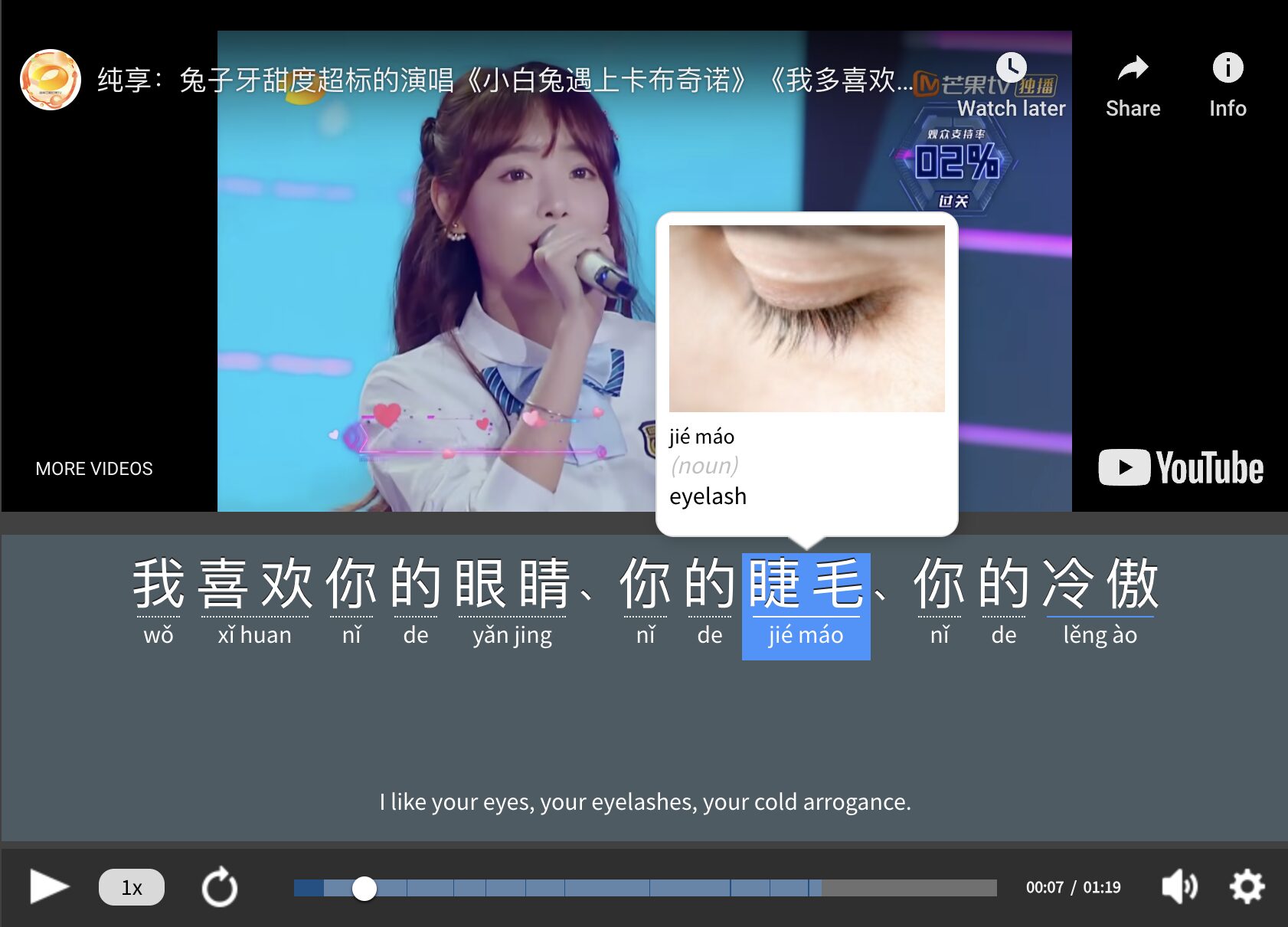Contents
- 1. 西施 (xī shī) — Xi Shi
- 2. 老师 (lǎo shī) — The Teacher
- 3. 凉鞋 (liáng xié) — Flip-flops
- 4. 凤凰 (fèng huáng) — Phoenix
- 5. 妈妈骑马 (mā ma qí mǎ) — Mother Rides a Horse
- 6. 吃葡萄 (chī pú tao) — Eat Grapes
- 7. 梨和泥 (lí hé ní) — Pear and Mud
- 8. 蝴蝶飞 (hú dié fēi) — Butterfly Flies
- 9. 四是四 (sì shì sì) — Four is Four
- 10. 八百标兵 (bā bǎi biāo bīng) — 800 Soldiers
- 11. 黑化肥,灰化肥 (hēi huà féi, huī huà féi) — Black Fertilizer, Gray Fertilizer
- 12. 藤 (téng) — The Vine
- 13. 眼圆 (yǎn yuán) — Round Eyes
- 14. 鸟和猫 (niǎo hé māo) — The Bird and the Cat
- 15. 扁担 (biǎn dan) — Bamboo Pole
- 16. 知道就说知道 (zhī dào jiù shuō zhī dào) — If You Know, Say You Know
- 17. 鸟岛 (niǎo dǎo) — Bird Island
- 18. 牛郎恋刘娘 (niú láng liàn liú niáng) — The Ox Herder Boy Loves Lady Liu
- 19. 施氏食狮史 (shī shì shí shī shǐ) — The Lion-eating Poet
- 20. 喇嘛和哑巴 (lǎ ma hé yǎ ba) — The Monk and the Mute
- How to Master Chinese Tongue Twisters
- And one more thing...
20 Chinese Tongue Twisters for Pronunciation Practice [Audio Included]

No matter the language, tongue twisters— 绕口令 (rào kǒu lìng)—are a fun way to help with pronunciation, whether you’re a learner or a native speaker.
Keep reading for 20 Chinese tongue twisters that can help your pronunciation and speaking skills.
Download: This blog post is available as a convenient and portable PDF that you can take anywhere. Click here to get a copy. (Download)
1. 西施 (xī shī) — Xi Shi
Target: Differentiating between x and sh
西施死时四十四。
(xī shī sǐ shí sì shí sì.)
Xi Shi died at 44.
2. 老师 (lǎo shī) — The Teacher
Target: Tones with sh
老师是不是四十四岁?
(lǎo shī shì bú shì sì shí sì suì?)
Is the teacher 44 years old?
3. 凉鞋 (liáng xié) — Flip-flops
Target: The five tones
凉鞋为乐趣飞出你的脚!
(liáng xié wèi lè qù fēi chū nǐ de jiǎo!)
Flip-flops fly off your feet for fun!
4. 凤凰 (fèng huáng) — Phoenix
Target: ong, eng and uang finals
红凤凰,
(hóng fèng huáng,)
Red phoenix,
粉凤凰,
(fěn fèng huáng,)
pink phoenix,
粉红凤凰。
(fěn hóng fèng huáng.)
pink-red phoenix.
5. 妈妈骑马 (mā ma qí mǎ) — Mother Rides a Horse
Target: The five tones
妈妈骑马。
(mā ma qí mǎ.)
Mother rides a horse.
马慢,
(mǎ màn,)
The horse is slow,
妈妈骂马。
(mā ma mà mǎ.)
mother scolds the horse.
6. 吃葡萄 (chī pú tao) — Eat Grapes
Target: Differentiating between b, p and t
吃葡萄不吐葡萄皮,
(chī pú tao bù tǔ pú tao pí,)
Eat grapes without spitting out the grape skins,
不吃葡萄倒吐葡萄皮。
(bù chī pú tao dào tǔ pú tao pí.)
don’t eat grapes and spit out the grape skins.
7. 梨和泥 (lí hé ní) — Pear and Mud
Target: i finals
树上有梨
(shù shàng yǒu lí)
On the tree is a pear
地上有泥
(dì shàng yǒu ní)
On the ground is mud
风刮梨
(fēng guā lí)
The wind knocks off the pear
梨落地
(lí luò dì)
The pear falls to the ground
梨滚泥
(lí gǔn ní)
The pear rolls in the mud
泥沾梨。
(ní zhān lí.)
The mud moistens the pear.
8. 蝴蝶飞 (hú dié fēi) — Butterfly Flies
Target: ei, u and ie finals
黑蝴蝶飞,
(hēi hú dié fēi,)
The black butterfly flies,
灰蝴蝶飞,
(hūi hú dié fēi,)
the gray butterfly flies,
黑蝴蝶飞完,
(hēi hú dié fēi wán,)
after the black butterfly flies,
灰蝴蝶飞。
(hūi hú dié fēi.)
the gray butterfly can fly.
9. 四是四 (sì shì sì) — Four is Four
Target: Differentiating between sh and s
四是四,
(sì shì sì,)
Four is four,
十是十,
(shí shì shí,)
ten is ten,
十四是十四,
(shí sì shì shí sì,)
fourteen is fourteen,
四十是四十,
(sì shí shì sì shí,)
forty is forty,
四十四是四十四。
(sì shí sì shì sì shí sì.)
forty-four is forty-four.
10. 八百标兵 (bā bǎi biāo bīng) — 800 Soldiers
Target: Differentiating between a, ai, and iao
八百标兵奔北坡,
(bā bǎi biāo bīng bèn běi pō,)
Eight hundred spearmen rush to the northern slope.
炮兵并排北边跑,
(pào bīng bìng pái běi bian pǎo,)
Artillery soldiers run side by side to the north.
炮兵怕把标兵碰,
(pào bīng pà bǎ biāo bīng pèng,)
The artillery soldiers fear bumping into the spearmen.
标兵怕碰炮兵炮。
(biāo bīng pà pèng pào bīng pào.)
The spearmen fear bumping into the artillerymen’s cannon.
11. 黑化肥,灰化肥 (hēi huà féi, huī huà féi) — Black Fertilizer, Gray Fertilizer
Target: ei, ua and ui finals
黑化肥发灰,
(hēi huà féi fā huī,)
Black fertilizer turns gray,
灰化肥发黑。
(huī huà féi fā hēi.)
gray fertilizer turns black.
黑化肥发灰会挥发,
(hēi huà féi fā huī huì huī fā,)
Black fertilizer that turns gray can be volatile,
灰化肥挥发会发黑。
(huī huà féi huī fā huì fā hēi.)
gray fertilizer will turn black when it volatilizes.
12. 藤 (téng) — The Vine
Target: ing, ang, eng and ong finals
青青山上一根藤,
(qīng qīng shān shàng yì gēn téng,)
On a green mountain is a vine.
青藤底下挂铜铃,
(qīng téng dǐ xià guà tóng líng,)
Under the green vine hang copper bells.
风吹藤动铜铃动,
(fēng chuī téng dòng tóng líng dòng,)
The wind blows, the vine moves, (and) the copper bells move.
风停藤停铜铃停。
(fēng tíng téng tíng tóng líng tíng.)
The wind stops, the vine stops, (and) the copper bells stop.
13. 眼圆 (yǎn yuán) — Round Eyes
Target: Pronouncing yan and yuan
村前有个颜圆眼。
(cūn qián yǒu gè yán yuán yǎn.)
In front of the village is a Yan Yuanyan.
村后有个颜眼圆。
(cūn hòu yǒu gè yán yǎn yuán.)
Behind the village is a Yan Yanyuan.
不知颜圆眼的眼圆,
(bù zhī yán yuán yǎn de yǎn yuán,)
(I) don’t know if Yan Yuanyan’s eyes are rounder,
还是颜眼圆的眼圆?
(hái shì yán yǎn yuán dē yǎn yuán?)
or Yan Yanyuan’s eyes are rounder?
14. 鸟和猫 (niǎo hé māo) — The Bird and the Cat
Target: Pronouncing niao and mao
树上一只鸟,
(shù shàng yì zhī niǎo,)
In the tree is a bird,
地上一只猫。
(dì shàng yì zhǐ māo.)
on the ground is a cat.
地上的猫想咬树上的鸟,
(dì shàng de māo xiǎng yǎo shù shàng de niǎo,)
The cat on the ground tries to bite the bird in the tree.
树上的鸟想啄猫的毛。
(shù shàng de niǎo xiǎng zhuó māo de máo.)
The bird in the tree tries to peck at the cat’s fur.
15. 扁担 (biǎn dan) — Bamboo Pole
Target: Various final combinations with a
扁担长,板凳宽,
(biǎn dan cháng, bǎn dèng kuān,)
The bamboo pole is long, and the wooden bench is wide.
扁担要绑在板凳上,
(biǎn dan yào bǎng zài bǎn dèng shàng,)
The bamboo pole should be tied to the bench.
板凳不让扁担绑在板凳上,
(bǎn dèng bú ràng biǎn dan bǎng zài bǎn dèng shàng,)
The bench won’t let the pole be tied to it,
扁担非要绑在板凳上。
(biǎn dan fēi yào bǎng zài bǎn dèng shàng.)
but the pole has to be tied to the bench.
16. 知道就说知道 (zhī dào jiù shuō zhī dào) — If You Know, Say You Know
Target: zh initial
知道就说知道,
(zhī dào jiù shuō zhī dào,)
If (you) know, just say (you) know.
不知道就说不知道,
(bù zhī dào jiù shuō bù zhī dào,)
If (you) don’t know, just say (you) don’t know.
不要知道说不知道,
(bú yào zhī dào shuō bù zhī dào,)
Don’t say (you) don’t know when (you) know,
也不要不知道说知道,
(yě bú yào bù zhī dào shuō zhī dào,)
and also don’t say (you) know when (you) don’t know,
你知道不知道?
(nǐ zhī dào bù zhī dào?)
you know or not?
17. 鸟岛 (niǎo dǎo) — Bird Island
Target: ao and iao finals
鸟岛是岛,
(niǎo dǎo shì dǎo,)
Bird Island is an island;
鸟岛有鸟。
(niǎo dǎo yǒu niǎo.)
Bird Island has birds.
鸟岛的鸟多得数不清了。
(niǎo dǎo de niǎo duō de shǔ bù qīng le.)
The birds on Bird Island are countless.
要想到鸟岛,
(yào xiǎng dào niǎo dǎo,)
If (you’re) thinking of going to Bird Island,
一定要爱鸟。
(yì dìng yào ài niǎo.)
(you) must love birds.
你不爱小鸟,
(nǐ bú ài xiǎo niǎo)
If (you) don’t love small birds,
就别到鸟岛。
(jiù bié dào niǎo dǎo.)
don’t go to Bird Island.
18. 牛郎恋刘娘 (niú láng liàn liú niáng) — The Ox Herder Boy Loves Lady Liu
Target: iu, iang and ang finals
For all of you romantics out there, this tongue twister was specially chosen for you! Brace yourselves though, it’s a slightly longer and more complex one.
牛郎恋刘娘,刘娘念牛郎,
(niú láng liàn liú niáng, liú niáng niàn niú láng,)
The ox herder boy loves Lady Liu, Lady Liu longs for the ox herder boy.
牛郎牛年恋刘娘,刘娘年年念牛郎,
(niú láng niú nián liàn liú niáng, liú niáng nián nián niàn niú láng,)
The ox herder boy loves Lady Liu in the Year of the Ox, Lady Liu longs for the ox herder boy every year.
郎恋娘来娘恋郎,
(láng liàn niáng lái niáng liàn láng,)
The boy loves the lady and the lady longs for the boy,
念娘恋郎念郎恋娘,
(niàn niáng liàn láng niàn láng liàn niáng,)
The longing lady loves the boy and the longing boy loves the lady.
念恋娘郎,绕不晕你算我白忙。
(niàn liàn niáng láng, rào bù yūn nǐ suàn wǒ bái máng.)
Longing, loving, lady, boy. If you aren’t dizzy by now, I’ve wasted my effort.
19. 施氏食狮史 (shī shì shí shī shǐ) — The Lion-eating Poet
Target: shi variations
石室诗士施氏,嗜狮,誓食十狮。
(shí shì shī shì shī shì, shì shī, shì shí shí shī.)
In a stone room lived a poet named Shi Shi, a lion lover, who swore to eat ten lions.
氏时时适市视狮。
(shì shí shí shì shì shì shī.)
He often went to the market to look for lions.
十时,适十狮适市。
(shí shí, shì shí shī shì shì.)
At ten o’clock, ten lions arrived at the market.
是时,适施氏适市。
(shì shí, shì shī shì shì shì.)
At that time, Shi arrived at the market.
氏视是十狮,恃矢势,使是十狮逝世。
(shì shì shì shí shī, shì shǐ shì, shǐ shì shí shī shì shì.)
Looking at the ten lions, he used his trusty arrows, causing the ten lions to die.
氏拾是十狮尸,适石室。
(shì shí shì shí shī shī, shì shí shì.)
Shi brought the corpses of the ten lions to the stone room.
石室湿,氏使侍拭石室。
(shí shì shī, shì shǐ shì shì shí shì.)
The stone room was damp. Shi asked his servants to wipe it.
石室拭,氏始试食是十狮。
(shí shì shì, shì shǐ shì shí shì shí shī.)
As the stone room was being wiped, Shi began to try to eat the meat of the ten lions.
食时,始识是十狮尸,实十石狮尸。
(shí shí, shǐ shí shì shí shī shī, shí shí shí shī shī.)
When it was mealtime, he realized that the ten lions were in fact ten stone lion corpses.
试释是事。
(shì shì shì shì.)
Try to explain this matter.
20. 喇嘛和哑巴 (lǎ ma hé yǎ ba) — The Monk and the Mute
Target: l and b initials
打南边来了个哑巴,腰里别了个喇叭;
(dǎ nán bian lái le gè yǎ ba, yāo lǐ bié le gè lǎ ba;)
From the south comes a mute, carrying a trumpet pinned to his waist.
打北边来了个喇嘛,手里提了个獭犸。
(dǎ běi biān lái le gè lǎ ma, shǒu lǐ tí le gè tǎ mǎ.)
From the north comes a monk, holding a flatfish in his hand.
提着獭犸的喇嘛要拿獭犸换别着喇叭的哑巴的喇叭;
(tí zhe tǎ mǎ de lǎ ma yào ná tǎ mǎ huàn bié zhe lǎ ba de yǎ ba de lǎ ba;)
The monk holding a flatfish wants to trade his flatfish for a trumpet, with the mute carrying a trumpet.
别着喇叭的哑巴不愿拿喇叭换提着獭犸的喇嘛的獭犸。
(bié zhe lǎ ba de yǎ ba bú yuàn ná lǎ ba huàn tí zhe tǎ mǎ de lǎ ma de tǎ mǎ.)
The mute carrying a trumpet doesn’t want to trade his trumpet with the monk holding a flatfish for the flatfish.
不知是别着喇叭的哑巴打了提着獭犸的喇嘛一喇叭;
(bù zhī shì bié zhe lǎ ba de yǎ ba dǎ le tí zhe tǎ mǎ de lǎ ma yì lǎ ba;)
(I) don’t know if the mute carrying a trumpet hits the monk holding a fish with his trumpet,
还是提着獭犸的喇嘛打了别着喇叭的哑巴一獭犸。
(hái shì tí zhe tǎ mǎ de lǎ ma dǎ le bié zhe lǎ ba de yǎ ba yì tǎ mǎ.)
or the monk carrying a flatfish uses his fish to hit the mute carrying a trumpet.
喇嘛回家炖獭犸,哑巴嘀嘀哒哒吹喇叭。
(lǎ ma huí jiā dùn tǎ mǎ, yǎ ba dī dī dā dā chuī lǎ ba.)
The monk goes home and stews his flatfish. The mute plays his trumpet.
By the way, there’s actually a song for this tongue twister. (Note that it has been modified slightly.)
How to Master Chinese Tongue Twisters
Practicing the Chinese tongue twisters above can strengthen your pronunciation and speaking skills. Some speech therapists even use twisters in their practices for native speakers. So here’s how to master them yourself:
- Always start slow. Make sure you have a good grasp of individual words first. If you’re working on a longer twister, break it into parts (line by line, for example). Once you’ve got the hang of each section, work on putting it together and building up speed.
- Target sounds you struggle with. Do you often mispronounce the zh sound? Is switching between h and f in #11 especially difficult? Whatever the case is, pick out the twisters that include your weakest sounds and keep practicing until they’re second nature.
- Don’t forget about tones. Maybe you think saying all the individual sounds is actually pretty easy (must be nice!). If so, turn your attention to the tones of each word and make sure you’ve got that part down pat as well. A tongue twister like #19 is basically meaningless if the tones aren’t right.
- Have competitions. Once you’ve practiced with these tongue twisters, see how they’ve helped you. Challenge your Chinese friends to a tongue twister competition! Who can say it fastest? Who can say it the most times without messing up?
- Combine tongue twisters with other speaking practice methods. Beyond chatting with natives, you can also reap the rewards of this practice in other ways. Try reading along with (or shadowing) the subtitles on your favorite Chinese shows or movies, for example. You can do this easily with a program like FluentU.
FluentU takes authentic videos—like music videos, movie trailers, news and inspiring talks—and turns them into personalized language learning lessons.
You can try FluentU for free for 2 weeks. Check out the website or download the iOS app or Android app.
P.S. Click here to take advantage of our current sale! (Expires at the end of this month.)
And if you’re feeling discouraged, don’t. I highly recommend checking out this video of a Chinese teacher quizzing random locals on a Chinese tongue twister for some good loves and a morale boost.
Have fun with these sentences, and try not to get your tongue totally tied up in knots!
Download: This blog post is available as a convenient and portable PDF that you can take anywhere. Click here to get a copy. (Download)
And one more thing...
If you like learning Chinese at your own pace and from the comfort of your device, I have to tell you about FluentU.
FluentU makes it easier (and more fun) to learn Chinese by making real content like movies and series accessible to learners. You can check out FluentU's curated video library, or bring our learning tools directly to Netflix or YouTube with the FluentU Chrome extension.
One of the features I find most helpful is the interactive captions—you can tap on any word to see its meaning, an image, pronunciation, and other examples from different contexts. It’s a great way to pick up vocab without having to pause and look things up separately.
FluentU also helps reinforce what you’ve learned with personalized quizzes. You can swipe through extra examples and complete engaging exercises that adapt to your progress. You'll get extra practice with the words you find more challenging and even be reminded you when it’s time to review!
You can use FluentU on your computer, tablet, or phone with our app for Apple or Android devices. Click here to take advantage of our current sale! (Expires at the end of this month.)











